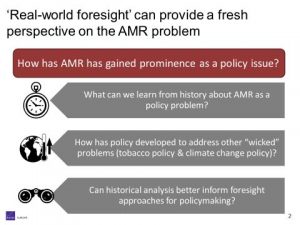In 2016 a landmark UN Declaration to combat antimicrobial resistance (AMR) was signed by 193 countries, demonstrating the importance of the problem, the need for global action to tackle it and the rise of AMR as global policy issue. National and transnational policies seek to set a course of action to try to tackle multiple components of AMR and reach or exceed the commitments within the UN Declaration. In this study we are interested in taking an historical perspective to understand the evolution of the AMR policy agenda and to inform policymaking. Historical analysis can make an important contribution to policy design, although lessons from the past are often overlooked. Equally, historical research does not often engage with futures methods such as scenario planning.
AMR is typically characterised as an intractable problem that requires many different parties to come together to fully address it. Understanding the uniqueness of AMR is important but there is also potential to learn from other large-scale and complex problems. In this study we take a comparative approach to understanding AMR in relation to climate change and tobacco control. All three issues have in common their complexity, enduring nature and important public health consequences.
Our study runs from December 2017 to February 2020. We will combine historical and foresight analysis with engagement with policymakers and key stakeholders to:
- Understand how AMR has evolved as a policy issue and develop scenarios for AMR policymaking responses that are informed by historical analysis
- Test these scenarios to inform potential policy responses
- Provide evidence for effective and efficient AMR policymaking and methodological development through the use of historical perspectives to inform policy
Questions the research seeks to address

![]()

